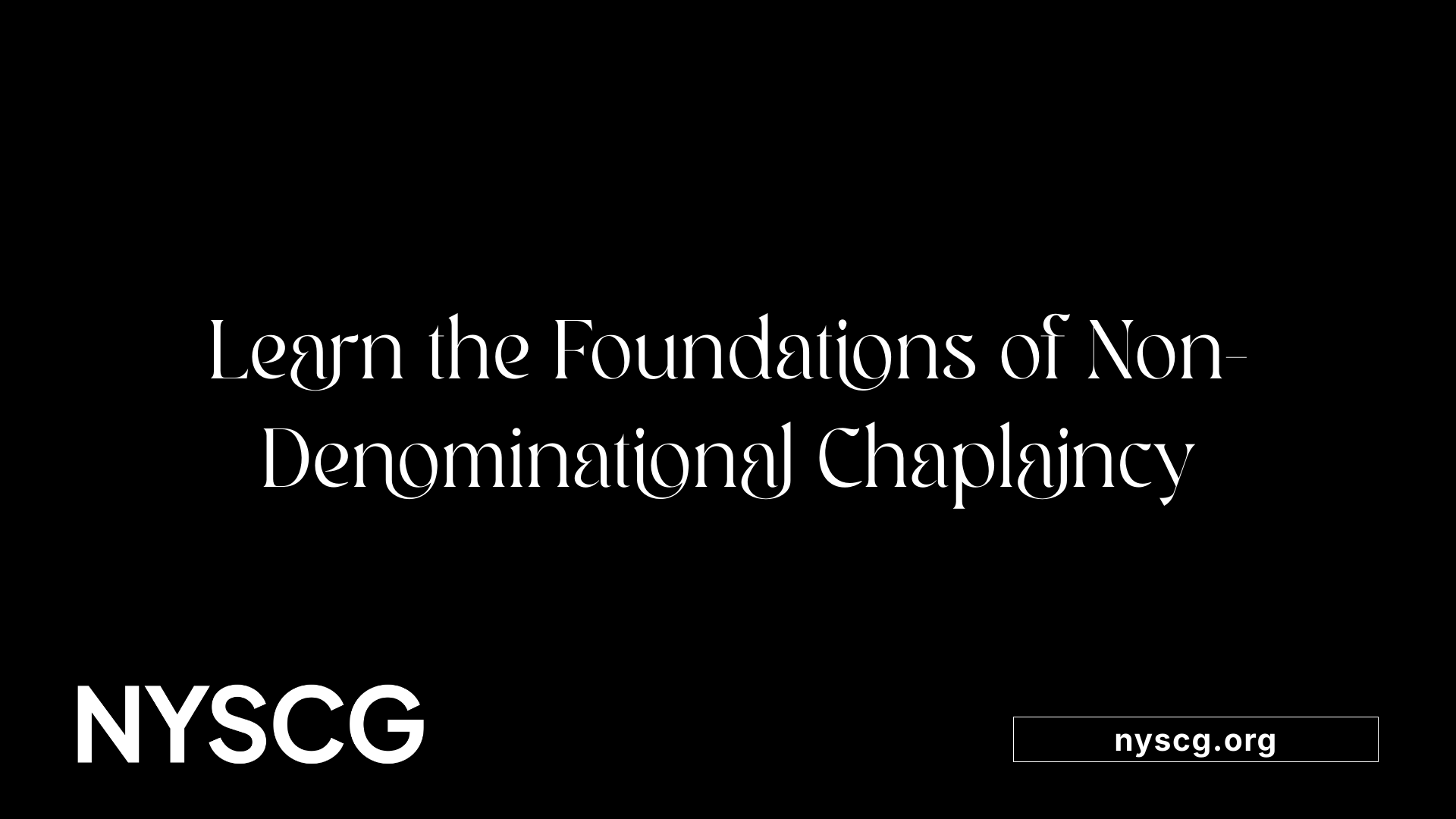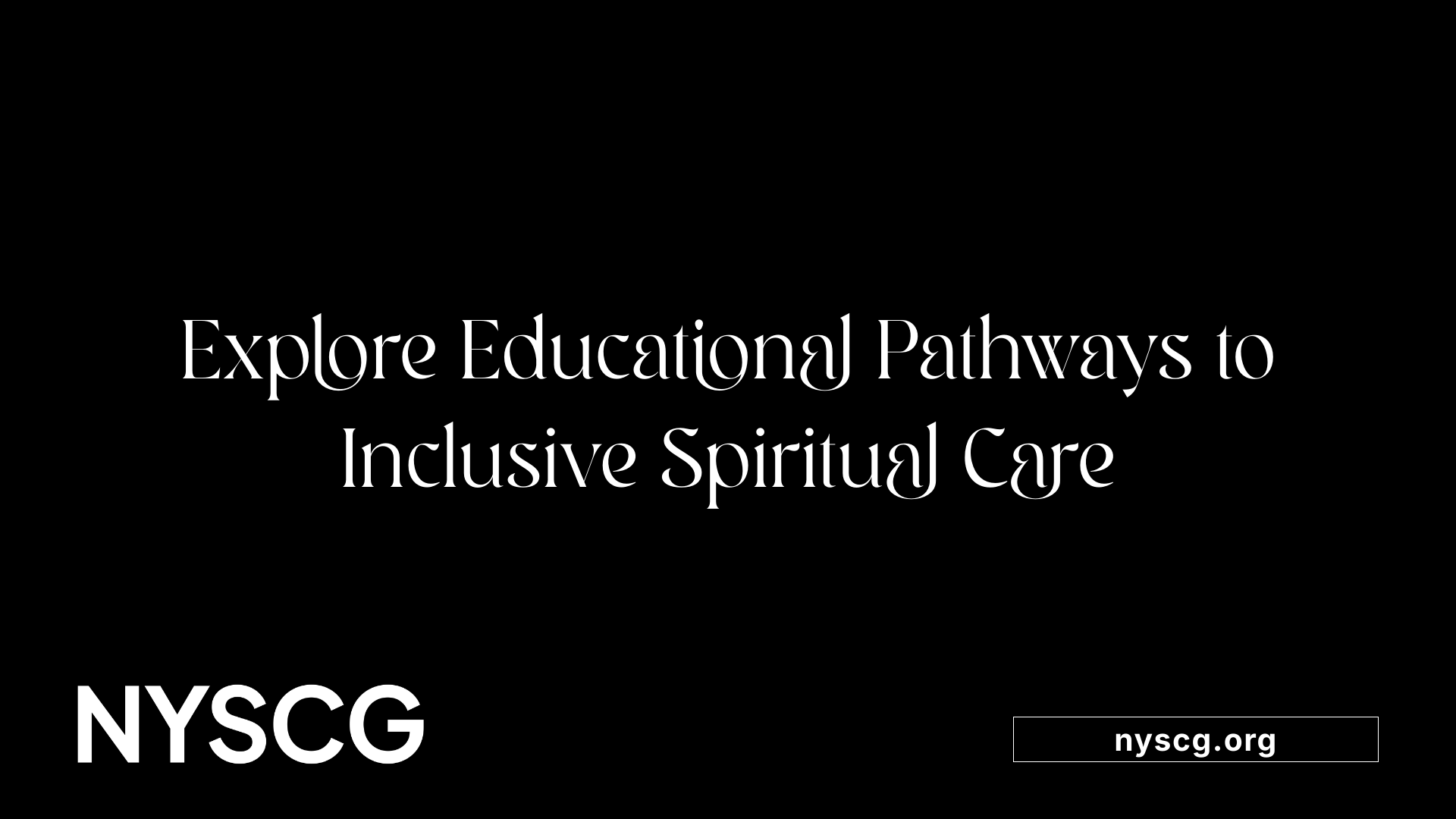Exploring Non-Denominational Paths to Becoming a Chaplain


As societies become increasingly diverse and secular, the role of chaplains has evolved to embrace a broad spectrum of spiritual and secular perspectives. This article explores non-denominational pathways to becoming a chaplain, emphasizing inclusive training, certifications, roles, and career opportunities across secular, interfaith, and multi-faith contexts.

To pursue a career as a non-denominational chaplain, individuals generally need a solid educational foundation in related fields. A minimum of a bachelor's degree in disciplines such as religious studies, theology, counseling, philosophy, or psychology is common. However, many employers and certifying bodies favor candidates who hold a master's degree, such as a Master of Divinity (MDiv) or equivalent Graduate Theological Studies credential, which provides comprehensive training in pastoral care, ethics, and spiritual leadership.
An essential component of training involves Clinical Pastoral Education (CPE). CPE offers practical, supervised experience in spiritual care settings like hospitals, hospices, or mental health facilities. This hands-on training helps future chaplains develop the skills necessary to serve individuals with diverse beliefs and backgrounds.
Certification pathways are often organized through professional organizations, which may require endorsement from a spiritual or religious organization, a background check, and evidence of practical experience. Certifications such as those from the Association of Professional Chaplains or boards like the Board for Certification of Chaplains are widely recognized. In the case of secular or humanist chaplains, certification can be sought through organizations like The Humanist Society or similar bodies that support non-religious spiritual care.
Overall, the pathway to becoming a non-denominational chaplain involves a combination of formal education, clinical training, endorsement processes, and ongoing professional development.
Non-denominational chaplains can attain various certifications that validate their skills and readiness to serve in diverse settings. The most recognized credentials come from organizations such as the Association of Professional Chaplains (APC) and the Board for Certification of Chaplains (BCCI). Credentials like the Board Certified Chaplain (BCC) or the Associate Certified Chaplain (ACC) are applicable after meeting educational, experiential, and training requirements.
Candidates are typically required to possess at least a bachelor's degree, with many pursuing a master's degree in areas such as theology, philosophy, or psychology, complemented by coursework in multiple world religions and spiritual practices. Completion of multiple units of Clinical Pastoral Education (CPE) is essential; four units are usually required to meet certification standards, along with a minimum of 2,000 hours of professional chaplaincy work.
In addition, endorsement from an appropriate faith group or professional body lends credibility and aligns with certification standards. For secular or humanist chaplains, specialized programs such as those offered through the Chaplaincy Institute or Interfaith programs at institutions like the Graduate Theological Union (GTU) offer tailored pathways to credentialing. These certifications open doors to employment in secular institutions and broaden the scope of spiritual care accessible to diverse populations.
Non-denominational chaplains enjoy a broad array of career opportunities across numerous secular environments. Their roles include providing emotional and spiritual support in hospitals, hospices, mental health clinics, correctional facilities, educational institutions, military bases, and workplaces.
In healthcare settings, non-denominational chaplains support patients, families, and staff by offering counseling, addressing existential questions, and facilitating end-of-life care. In the military, they provide spiritual support and conduct inclusive services that respect diverse belief systems. Correctional facilities employ chaplains to assist inmates in coping with imprisonment and spiritual needs.
Educational and workplace chaplaincy offers opportunities to serve students and employees, focusing on emotional resilience, ethical dilemmas, and personal growth. Many roles do not require ordination, making it accessible to those with relevant training and certifications who are committed to inclusivity and empathetic service.
Overall, careers in non-denominational chaplaincy emphasize holistic support that respects individual beliefs, fostering resilience and well-being in varied communities. This sector continues to grow as organizations recognize the importance of comprehensive, inclusive spiritual care that transcends traditional religious boundaries.

Entering the chaplaincy field with an emphasis on interfaith and secular approaches involves a multifaceted educational path. Prospective chaplains often pursue specialized certifications such as the Interfaith Studies Certification offered by institutions like The Chaplaincy Institute. These programs are designed for those wishing to serve diverse populations beyond traditional religious boundaries.
The curriculum typically includes courses on interfaith wisdom, spiritual psychology, and vocational formation, fostering intercultural competence and spiritual inclusivity. Practical training involves experiential learning in settings such as hospitals, prisons, military facilities, and community organizations.
Certification pathways may include completing theological coursework, engaging in Clinical Pastoral Education (CPE), and obtaining ordination or good standing as interfaith ministers. Many programs offer online and residential options, making them accessible to a broad range of students.
Overall, the journey combines theological studies, intercultural awareness, and practical ministry experience. These elements prepare individuals to serve in secular, multi-faith, and diverse communities effectively, emphasizing compassion, inclusivity, and cultural sensitivity.
Support for non-denominational chaplaincy is available through a variety of academic programs. Many institutions offer degrees like the Master of Divinity (MDiv), Master of Science in Spiritual Care, or similar graduate-level qualifications. These programs often include concentrations in chaplaincy, emphasizing skills necessary for diverse secular and faith-based environments.
For example, Wake Forest School of Divinity, United Theological Seminary, and Charlotte Christian College and Theological Seminary provide tailored tracks aligned with certification standards. They cover foundational topics such as pastoral care, counseling, officiating ceremonies, and intercultural understanding.
Online options further enhance accessibility. Portland Seminary offers a hybrid Master of Divinity with a chaplaincy specialization, blending online coursework with field education to meet certification requirements.
Specialized courses like the Graduate Certificate of Chaplaincy and Spiritual Care from Morling College focus on practical skills in aged care, mental health, hospitals, and corrections. These programs prepare students to serve a wide range of populations, fostering skills in intercultural communication and inclusive spiritual care.
Yes, prospective chaplains can find online or budget-friendly training options. Liberty University offers a fully online Postgraduate Certificate in Chaplaincy, which incorporates courses in theology, ethics, and leadership. This program can be completed in one semester at a low cost, with credits transferable toward master’s degrees.
The Christian Leaders Institute provides free courses in chaplaincy that focus on theological principles and practical ministry skills. These free courses are valuable for those exploring careers or supplementing ongoing education.
Further, Central Seminary offers online certificates in chaplaincy that do not require a full degree, making them accessible for individuals seeking initial certification or specialized training. These certificates include practicum components and prepare students for employment in various settings.
Additionally, the Chaplain Training Academy offers self-paced online programs, including Clinical Pastoral Education opportunities, designed for flexible learning and skill development. Virtual supervision and didactic sessions facilitate practical experience without geographic constraints.
Whether through affordable certificates or free foundational courses, aspiring chaplains have access to a range of online resources that support their educational journey toward inclusive spiritual care.

Non-denominational chaplains are essential figures in providing holistic spiritual and emotional support across a variety of secular settings. Their main role is to serve as compassionate witnesses and facilitators of well-being, regardless of individuals' faith backgrounds or secular beliefs.
These professionals work in environments such as hospitals, military bases, prisons, and workplaces, where they offer counsel, conduct spiritual or reflective ceremonies, and support individuals during critical moments like illness, grief, or moral crises. They help individuals explore existential questions and promote inner peace without promoting a particular religious doctrine.
Their duties include active listening, crisis intervention, facilitating comfort and hope, and connecting people with community resources, including faith-based services if desired. They support both patients and staff by addressing spiritual needs, fostering resilience, and nurturing moral integrity in sensitive situations.
Because they serve diverse populations, non-denominational chaplains are trained to respect all beliefs, acting as bridges across differences. Their approach emphasizes presence, empathy, and respect—providing care tailored to individual spiritual or secular understandings—thereby offering reassurance and moral support amidst life's challenges.
In secular and interfaith chaplaincy, ethical practice centers on respecting individual differences, maintaining confidentiality, and demonstrating cultural competence. Chaplains are committed to honoring the diversity of spiritual and secular beliefs, avoiding any form of proselytizing or religious endorsement.
Core principles include practicing autonomy—allowing individuals to set the boundaries for their spiritual or emotional care—and ensuring informed consent before engaging in any intervention. Respecting personal boundaries, avoiding conflicts of interest, and practicing impartiality are vital for maintaining trust and integrity.
Chaplaincy involves navigating complex moral dilemmas such as end-of-life decisions, conflicts between personal and professional beliefs, and issues of moral distress. Continuous ethical education and self-awareness are critical components of ongoing professional development.
Confidentiality is paramount, especially in sensitive environments like healthcare and correctional facilities, where trust is essential. Chaplains must balance transparency with respect for privacy, and understand legal and organizational policies governing their practice.
Non-denominational chaplains excel at serving diverse groups by fostering an inclusive, respectful environment where all individuals feel valued and understood. They employ active listening and culturally competent practices to meet a wide spectrum of spiritual and existential needs.
In secular settings, these chaplains focus on providing support that resonates with each individual's personal worldview—be it atheism, agnosticism, or various religious traditions—without promoting any specific belief system. They help individuals process feelings related to mortality, suffering, and purpose using approaches aligned with their values.
Support may include facilitating ceremonies that are meaningful to the person, offering emotional and moral guidance, or simply providing presence and reassurance. They often work collaboratively with interdisciplinary teams—such as medical staff, mental health professionals, and social workers—to deliver holistic care.
Through their training in intercultural and interfaith skills, non-denominational chaplains serve as advocates for diversity and inclusion, ensuring equitable spiritual care for all, especially in environments where religious endorsement may not be appropriate or desired. Their goal is to uphold individual dignity, foster resilience, and promote a sense of connection, peace, and purpose across a broad range of beliefs and secular attitudes.

Building effective skills for serving a wide range of people requires dedicated education, practical experience, and ongoing learning. Essential abilities include active listening, cultural awareness, spiritual sensitivity, crisis intervention, and strong ethical judgment.
Most aspiring non-denominational chaplains pursue formal education such as theology, counseling, or interfaith studies. Clinical Pastoral Education (CPE) provides hands-on training in real-world settings like hospitals or community organizations, sharpening relational and spiritual care skills.
Continuing education plays a critical role in maintaining and improving competence. Workshops, seminars, and specialized certifications help chaplains stay up-to-date with current practices, emerging issues, and new theological insights.
Networking with seasoned professionals, joining mentorship programs, and participating in organizations like the Association of Professional Chaplains (APC) or the Spiritual Care Association significantly enhances peer support and knowledge sharing. These relationships encourage reflective practice and foster resilience.
Personal qualities such as humility, emotional resilience, cultural humility, and openness to learn are equally vital. By embracing lifelong learning and embracing diverse worldviews, chaplains can serve individuals effectively regardless of their spiritual background or life situation.
As the landscape of spiritual and secular support continues to diversify, the pathway to becoming a non-denominational chaplain involves a blend of formal education, specialized training, ethical awareness, and ongoing professional development. These paths empower individuals to serve in a variety of secular and multi-faith environments, promoting compassion, understanding, and holistic well-being across diverse populations. Embracing inclusive education and certification options, combined with active engagement in professional communities, ensures that chaplains are well-equipped to meet the spiritual and emotional needs of individuals in an increasingly pluralistic world.
All you need is the will to make the world a better place.
New York State chaplain group inc. is a tax deductible organization with a federal tax Id number 92-383-4921